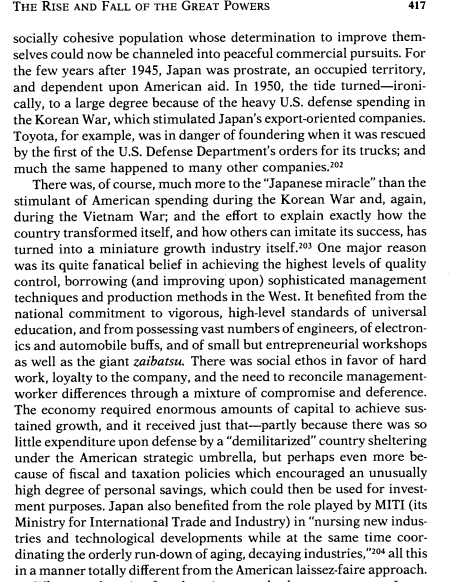sergentfox
New member
what would the world be like had there been no world war 2??
Not sure what happens in Asia, but in OTL, China has been emphasizing its cult of WWII. If there is no second Sino-Japanese War, that is big deal too.
One prediction that can be firmly made: Imperial Japan displaces the United States as the dominant economic power in the 1960s. How the world reacts to the Asian Century coming in the 1960s is going to be interesting, to say the least.
OTL's Japanese Economic Miracle was hugely historically contingent. First off, the Occupation enacted comprehensive land reform, which became a model for land reform elsewhere and broke the back of rural landlords as a political class. That doesn't happen without the Occupation of Japan (similar dynamic with land reform in the Republic of China/Taiwan- the KMT probably doesn't get land reform in an ATL where they don't get grafted on to Taiwan). Secondly, most of what we consider the genius of Japanese manufacturing was itself a development of American World War 2 era industrial management- you're not importing those practices or getting MITI to play such a central role without that cultural and technical exchange. And finally the export-focused model of development pursued by Japan IOTL only really worked because the US was willing to absorb those exports and effectively subsidize the Japanese economy by simultaneously allowing the Japanese to restrict imports and subsidize exports at the same time as allowing them unfettered access to US markets. And all of this is to say nothing of Article 9's impact which some say allowed post-War Japan to underinvest in the relatively economically unproductive business of maintaining offensive forces in land, sea and air and therefore, to overinvest elsewhere.

No World War 2 and I think it is far from clear that Imperial Japan becomes an economic superpower, even if we assume it holds the Home Islands, Taiwan and Korea.
One prediction that can be firmly made: Imperial Japan displaces the United States as the dominant economic power in the 1960s. How the world reacts to the Asian Century coming in the 1960s is going to be interesting, to say the least.
Not going to happen, without the USA defeating and occupying Japan first.
To begin with, Japan will be unable to occupy much more of China without seizing the resources of the British and Dutch Empires, and without the Fall of France, there will be no Japanese forces based in Indochina to enable this.
Japan will remain an aggressive pariah state with feuding militaries, as per most of the 1930s
See the above post; Paul Kennedy rejects those arguments and its GDP was already growing 5% a year since the late 1920s; they were already matching the Soviets in machine tools and IIRC had a higher productivity rate. The organizational structures also had Pre-War continuity with the Post-War ones.
The organizational structures did NOT have continuity- the zaibatsu were by and large eliminated (and many were partially nationalized during the war before their post-war dissolution). The zaibatsu (vertically integrated, commonly held by a single family with interlocking directorships, which was specifically banned post-War) were not the same as the keiretsu (generally horizontally integrated with financialized equity and capital relationships to one another and generally, to a sponsoring commercial bank). They are not the same.
In addition the passage you cited specifically calls out the influence of WW2 era American industrial management, the lack of Japanese defense spending, the US subsidizing Japanese industry directly and indirectly, and the role of MITI. Paul Kennedy's passage does not read to me as agreeing with you- it is arguing the Japanese miracle was historically contingent upon the Occupation of Japan.
See the above post; Paul Kennedy rejects those arguments and its GDP was already growing 5% a year since the late 1920s..
